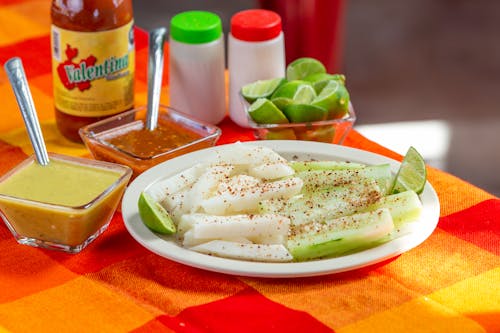
Is it a potato? A brown beet? a turnip? No!! It’s a jicama!!
Have you even tasted jicama?
It’s a root veggie that you might have seen in your local grocery store or farmers’ market, but never knew what to do with it. It’s not pretty on the outside, but it is crunchy and delicious and slightly sweet on the inside. If you’re ready to try something new, this root vegetable could become your new best friend for salads, crudités, and even Chinese food! It adds crunch that you will love.. Just peel and slice!!

What is Jicama?
Jicama (pronounced “HEE-cah-ma”) is a crisp, root vegetable native to Mexico and Central America. It’s also known as the Mexican turnip or yam bean.
Despite its starchy texture, jicama is low in calories and fat, yet high in vitamins and minerals, making it a fantastic addition to any diet.
 |
| Jicama sticks with chili powder- A Mexican treat |
How to Use Jicama
Jicama’s mild, slightly sweet flavor and crunchy texture make it incredibly versatile. Here are some ways to use it:
- Raw:
- Slice it up and serve it with your favorite dips such as homemade hummus (recipe link) or homemade guacamole (recipe link).
- Include jicama cut up jicama sticks to your next vegetable and dip tray.
- Dice pieces or grate jicama into salads for an added crunch or cut like carrot sticks for a quick snack covered in paprika or chili powder if you like a kick!
- Cooked:
- It’s delicious in a stir fry, roasted, or air-fried.
- It’s a great substitute for water chestnuts in Chinese recipes.
- In Wraps:
- Use thin jicama slices as a crunchy, low-carb filler
- As Chips:
- Thinly slice jicama, season, and bake on a high temp for a healthier alternative to potato chips or cut into sticks for roasted jicama fries.

Nutritional Benefits
Jicama isn’t just tasty; it’s also packed with benefits that makes it a nutritional powerhouse:
- Low in Calories: Perfect for those watching their calorie intake.
- Rich in Fiber: Great for digestion and maintaining a healthy gut.
- Vitamin C: Boosts your immune system and helps with collagen production.
- Potassium: Supports healthy blood pressure levels and muscle function.
- Antioxidants: Helps fight oxidative stress and supports overall health.
- Blood Sugar: I found the following blood sugar information on The Food Revolution Network (link to site) : I quote the article:
“Jicama also has unique properties that can be good for diabetics and blood glucose management. A 2016 study in mice found that six weeks of jicama extract administration significantly reduced blood sugar and Hgb A1c levels, and increased insulin sensitivity.
The low glycemic load of jicama also makes it a good option for people with diabetes, as it won’t spike blood sugar. And its fiber content aids in weight loss, primarily by increasing satiety (a fancy word that means that it makes you feel full). This is another way it contributes to fighting diabetes.”
How to Pick Out Jicama
When you’re shopping for jicama, here’s what to look for:
- Firmness: Choose a jicama that feels firm to the touch. Avoid any with soft spots or wrinkles.
- Skin Color: The skin should be a light brown, tan, or beige. Steer clear of any with dark spots or blemishes.
- Size: Jicama comes in various sizes, but larger ones can be a bit more fibrous. Medium-sized jicamas are often the sweetest and most tender.
Cleaning and Storing Jicama
Cleaning: Jicama has a tough, brown outer skin that needs to be peeled off before eating. Here’s how to do it:
- Wash: Rinse the jicama under cold water to remove any dirt.
- Peel: Use a vegetable peeler or a knife to remove the outer skin. Be thorough, as the skin can be a bit tough.
- Cut: It can be sliced into rounds, sticks, or cubes, depending on how you want to eat it such as adding it to a crudités vegetable and dip platter.
Storing: How to keep jicama fresh:
- In the Fridge: Store unpeeled jicama in a cool, dry place or in the refrigerator if you’ve already peeled it. It can last up to 2 weeks in the fridge.
- In the Pantry: Unpeeled, whole jicama can be kept in a cool, dry place for about 1-2 weeks.
Why Eat Jicama?
Next time you see a funny looking round brown jicama in the market, you will know what it is and how to use it.
Incorporating jicama into your diet isn’t just about trying something new. Its mild flavor and crunchy texture can elevate everything from salads to snacks, and its health benefits add even more reasons to try it and love it.

Mashed ( potato) Jicama
Peel and cube jicama. Boil or steam until tender. Mash with fork. Add salt and pepper or any seasoning that you would add to mashed potatoes.
Do you like jicama? How do you use it?
My Notes:
1. Jicama, like all vegetables, is naturally gluten-free
Disclaimer: I am not a medical doctor and am not trying to diagnose or treat disease. The information on this blog is for educational purposes only. Always consult your medical doctor before changing your diet or adding new foods to your diet.


